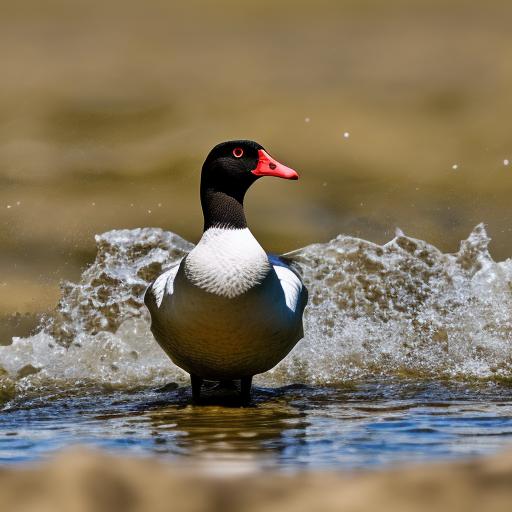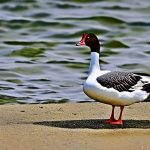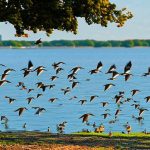Geese on beaches have become a growing problem in many coastal areas. While these birds may seem harmless, they can actually have a negative impact on both the environment and beachgoers. Geese are attracted to beaches because they provide an open space with easy access to water and food sources. However, their presence can lead to damage to vegetation, water quality issues, and health risks associated with their feces.
Key Takeaways
- Geese on beaches can cause a variety of problems for both humans and the environment.
- Understanding the behavior of geese is crucial for developing effective management strategies.
- Geese can negatively impact beaches by damaging vegetation, leaving droppings, and posing a health risk.
- Legal considerations must be taken into account when dealing with geese, as they are protected under certain laws.
- Non-lethal methods, such as physical barriers, trained dogs, repellents, and environmental modifications, can be effective in deterring geese from beaches.
Understanding the behavior of geese
To effectively address the issue of geese on beaches, it is important to understand their behavior. Geese are social animals that typically live in large flocks. They are attracted to beaches because they provide a suitable habitat for nesting and feeding. Geese are herbivores and feed on grasses, aquatic plants, and grains. They are also attracted to open spaces where they can easily spot predators.
During nesting season, geese become more territorial and protective of their nests. They will aggressively defend their nesting sites, which can lead to conflicts with beachgoers and other wildlife. Understanding these behaviors can help in developing strategies to deter geese from beaches.
The negative impact of geese on beaches
The presence of geese on beaches can have several negative impacts. One of the main concerns is the damage they cause to vegetation. Geese feed on grasses and other plants, which can lead to the destruction of dune vegetation and erosion issues. This can disrupt the natural ecosystem and impact the stability of the beach.
Another concern is the impact on water quality. Geese feces contain high levels of bacteria, which can contaminate water sources such as lakes and ponds near the beach. This poses a risk to both humans and other wildlife that come into contact with the contaminated water.
Legal considerations for dealing with geese
When dealing with geese on beaches, it is important to consider the legal aspects. In many areas, geese are protected under wildlife conservation laws, which means that certain permits and regulations may be required to manage their populations. It is important to consult with local authorities and wildlife experts to ensure that any actions taken are in compliance with the law.
Following local laws and regulations is not only important from a legal standpoint, but also from an ethical one. It is crucial to find solutions that are effective and humane, without causing harm to the geese or other wildlife.
Non-lethal methods for keeping geese away
There are several non-lethal methods that can be used to keep geese away from beaches. One approach is the use of noise makers, such as air horns or whistles, to scare away the birds. Visual deterrents, such as scarecrows or reflective tape, can also be effective in deterring geese.
While these methods can be effective in the short term, they may not provide a long-term solution. Geese can become habituated to these deterrents over time, rendering them less effective. Additionally, these methods may not be suitable for all beach environments or may cause disturbances to other wildlife.
Physical barriers to prevent geese from accessing the beach

Physical barriers can be an effective way to prevent geese from accessing beaches. Fencing or netting can be installed to create a barrier between the geese and the beach. This can help protect vegetation and prevent geese from nesting on the beach.
However, it is important to consider the potential drawbacks of using physical barriers. They can be expensive to install and maintain, and may not be aesthetically pleasing in some beach environments. Additionally, they may not completely eliminate the presence of geese, as they can find alternative nesting sites nearby.
Use of trained dogs to deter geese
Trained dogs can be an effective method for deterring geese from beaches. Border collies, in particular, are known for their ability to herd and chase away geese. These dogs are trained to respond to commands and can be used to patrol beaches and scare away geese.
The use of trained dogs can be a humane and effective method for managing geese populations on beaches. However, it is important to ensure that the dogs are properly trained and supervised to prevent any harm to the geese or other wildlife.
Repellents and deterrents to discourage geese
There are various repellents and deterrents available that can discourage geese from beaches. These include sprays, gels, and decoys that mimic the presence of predators. These methods can create an inhospitable environment for geese and deter them from nesting or feeding on the beach.
While these methods can be effective, they may need to be reapplied regularly and may not provide a long-term solution. Additionally, it is important to consider the potential impact on other wildlife and the environment when using chemical repellents.
Environmental modifications to discourage geese
Modifying the environment can also be an effective way to discourage geese from beaches. Planting certain vegetation, such as tall grasses or shrubs, can create barriers that make it less attractive for geese to nest or feed on the beach. This can help protect dune vegetation and reduce erosion issues.
However, it is important to consider the potential drawbacks of environmental modifications. They may require ongoing maintenance and monitoring to ensure their effectiveness. Additionally, they may not completely eliminate the presence of geese, as they can find alternative food sources nearby.
Long-term solutions for managing geese populations on beaches
To effectively manage geese populations on beaches in the long term, it is important to implement a combination of strategies. This may include habitat modification, population control measures, and working with local authorities and wildlife experts.
Habitat modification can involve creating suitable nesting sites away from the beach, such as artificial islands or floating platforms. This can help redirect geese to more suitable habitats and reduce their impact on beaches.
Population control measures, such as egg addling or relocation, can also be considered. These methods aim to reduce the number of geese in a specific area without causing harm to the birds.
Working with local authorities and wildlife experts is crucial in developing and implementing long-term solutions. They can provide guidance on legal considerations, best practices, and monitoring techniques to ensure the effectiveness of the strategies.
In conclusion, geese on beaches can have a negative impact on both the environment and beachgoers. Understanding their behavior and implementing effective strategies is crucial in managing their populations. It is important to consider non-lethal methods, physical barriers, trained dogs, repellents, deterrents, and environmental modifications to discourage geese from beaches. Long-term solutions should involve habitat modification, population control measures, and collaboration with local authorities and wildlife experts. By taking action and working together, we can find effective and humane solutions to manage geese populations on beaches.
If you’re interested in learning more about how to keep geese off the beach, you might also find this article on “What Kind of Coop is Best for Chickens?” from Poultry Wizard helpful. While it may seem unrelated at first, understanding the different types of coops and their features can provide insights into creating effective barriers and deterrents for geese. Check out the article here to discover how chicken coop designs can be adapted to keep geese away from your favorite beach spots.
FAQs
What are the reasons for keeping geese off the beach?
Geese can cause damage to the beach ecosystem, create unsanitary conditions, and pose a threat to human safety.
What are some effective ways to keep geese off the beach?
Some effective ways to keep geese off the beach include using decoys, installing fencing or netting, using noise deterrents, and implementing habitat modification.
What are some natural ways to keep geese off the beach?
Some natural ways to keep geese off the beach include planting vegetation that geese do not like, using natural predators such as dogs or hawks, and creating barriers with rocks or driftwood.
What are some common mistakes people make when trying to keep geese off the beach?
Some common mistakes people make when trying to keep geese off the beach include using ineffective methods, not being consistent with their efforts, and not addressing the root cause of the geese’s presence.
Is it legal to harm or kill geese to keep them off the beach?
No, it is not legal to harm or kill geese to keep them off the beach. There are humane and effective methods that can be used to deter geese without causing harm to them.
Meet Walter, the feathered-friend fanatic of Florida! Nestled in the sunshine state, Walter struts through life with his feathered companions, clucking his way to happiness. With a coop that’s fancier than a five-star hotel, he’s the Don Juan of the chicken world. When he’s not teaching his hens to do the cha-cha, you’ll find him in a heated debate with his prized rooster, Sir Clucks-a-Lot. Walter’s poultry passion is no yolk; he’s the sunny-side-up guy you never knew you needed in your flock of friends!







